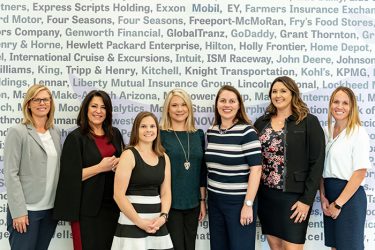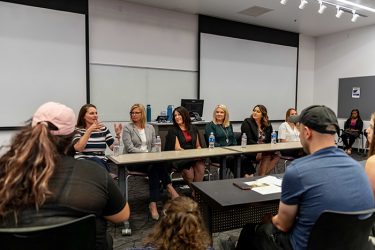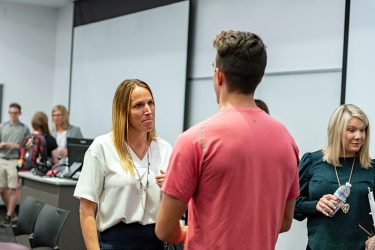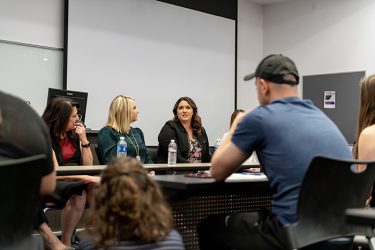
Story by Lana Sweeten-Shults
Photos by Mathew McGraw

Julie Giese showed animals at the county fair growing up on a dairy farm in Wisconsin.
While the grass wasn’t necessarily greener on the other side, the bevy of short-track race tracks certainly were faster, and it was at those race tracks where Giese’s passions revved up.
So after graduating from college, she sent her resume to every race track she could think of.
And every race track she could think of told her, “Thanks, but no thanks. You don’t match our qualifications.”
Giese ended up at an advertising agency, soaking up everything her female boss told her.
That boss? A game-changer.
“She taught me how to speak up for myself and how to raise my hand. … I’m a very introverted person by nature, so raising my hand was something I was not at all comfortable doing.”
A couple of years later, she inched her foot in the door of a racing job.
“Interestingly enough, I have those job letters still, and a couple of those people who sent those rejection letters to me are now my peers -- one person actually works for me,” said Giese, named president in 2018 of ISM Raceway in Avondale, a racing facility that recently received a $178 million upgrade.
Giese, the only current female president of a NASCAR track and only the second female president in racing ever, was one of six speakers in the standing-room-only Women in Leadership panel event on Wednesday in one of the lecture halls of Grand Canyon University’s Colangelo College of Business.

Giese shared the stage with Laura Lynn Smith, Division Vice President and General Manager of OneADP in Tempe; Emily Snell, President of InfoArmor; Linda Little, President of iHeartMedia, Arizona region; Nicole Johnson, Corporate Risk and Broking Market Leader of Willis Towers Watson; and Brooke Westemeier, an audit partner with Ernst & Young.
CCOB Associate Dean Dr. Allison Mason organized the panel, with four of the panelists coming from the CCOB Advisory Board and two others recommended by faculty.
"I had been wanting to organize a women in business event because it’s important that young women learn early on how important it is to have female leaders in an organization," said Mason." ... They were all clearly impressive ladies who came together to create a great event and share valuable insight to our students."
In the last 10 years, women-owned businesses have grown by more than 50% but there’s still more work to do, Mason asked the panel: “What are your thoughts on the growth of successful female leaders, and what are the hurdles you’ve overcome in your industry?”

“It’s growing, but it’s nowhere near where it should be, right?” said OneADP’s Laura Lynn Smith. “With the U.S. population being 50-50 on average, we should have equal representation of not only women entrepreneurs but also women sitting in senior leadership levels and on the C-suite level (chief executive officer level). Nationally, across the board, and this might be last year's statistics, but only 22% of senior-level roles are held by women in organizations in major corporations, and that’s nowhere near where it should be. … Until we get to that point, we should not be satisfied at where we’re at overall.”
Linda Little of iHeartMedia shared that in her industry, very few women are in leadership roles. “We’re in 150 markets. There are 10 women who lead those markets, so right there is a challenge.”
Willis Towers Watson’s Nicole Johnson commented that, when it comes to hurdles for female leaders, “The biggest hurdle is ourselves. The opportunities are there, and you have to be a champion for your own self, for your own career.”
Seek mentors, male and female, she advised. Find those who support you and take chances. “Don’t be your own hurdle. Seize the opportunities … and seek people that will help you and support you all the way.”

Little agreed that sometimes women are their own biggest hurdle and told a story from early in her career: “The thing I learned … and will share with all of you: Men speak up. Men will go ahead and promote themselves. Women really aren’t good at that. I wasn’t good at that. And I really had to learn the hard way when one of my peers -- personally I thought I was a better leader than he was -- got promoted, and I did not. I was pretty upset about it.”
She asked her boss why she wasn’t considered for the job, and he said, “I didn’t know you wanted to be.”
“So I learned at that moment going forward,” Little said, “that if I wanted that next step, I needed to speak up.”
Smith said, beyond speaking up, women shouldn't hesitate applying for jobs, whether they fit the qualifications perfectly or not. Men will apply for positions even though they might not feel qualified for it, “but women will only apply for positions that they feel they can be successful at right out of the gate -- and that has to change, as well. I read a statistic where women will only apply for the job if they can check 100% of the boxes, and men will apply if they can check at least 60%.”
Another piece of advice was shared by Emily Snell of InfoArmor, a startup company that the former third-grade teacher joined as the founder's first employee before it was bought by Allstate for $525 million. “Always say yes,” she said, when you’re asked to take on a leadership role. “You might go home and say, I have no idea what I said yes to. … Always say yes to the next position or the next opportunity.”

Ernst & Young’s Brooke Westemeier said part of the battle in getting what you want in your career is to not be afraid to be scared.
You’ll say, “I don’t know what I’m going to do,” Westemeier said. “I don’t know how I’m going to figure this out, how I’m going to balance it. … Take those opportunities because I think once you say no, then they don’t ask you again. So you just have to say yes and figure it out.”
Mason posed another question for the panel: “Women hold almost 52 percent of all management professional-level jobs yet lag behind men in terms of representation in leadership positions. … How does a woman in the boardroom make a positive impact in business?”
Snell said men and women are designed differently. They think differently, emotionally respond to problems differently.
Smith shared that being a female leader in an organization such as OneADP means that she brings a different voice and a diversity to the discussion: “My voice is very important to have at the table. … It has value. I have been in roles where I have been the only female in a department of VPs. … I have probably taken the stance of, not only is my voice important but because I’m the only female in the discussion, mine really has to be heard.”
Mason also wanted to know how these business leaders balance their work and personal lives.
Snell had to find some kind of balance after having infant twin boys at a time when the startup company she worked for was starting to take off. The career sacrifice her family had to make, she said was that her husband stayed home full-time with the twins. He did that for two years “and took a break from his career to support our family in that way.” He still keeps a modified schedule.
“That works for us,” Snell said. “But it may not work for all people. … Having those discussions early, if you have a desire to take your career in certain places, probably before marriage, is very important.”

Johnson said for her, “It’s mind over matter and there’s no such thing as balance. You’re going to pick and choose. It’s all about communication and creating your own boundaries, and I think it’s important to understand and give yourself grace that some days you’re going to fail on the home front and some days you’re not as great on the work front, and that’s OK.”
If she misses family time for work, it has to be important, but once that decision is made to go to a work event, she’s 100% there and vice versa with family time.
“It’s about creating your boundaries and not being apologetic and saying, ‘I’m going to muffins for mom and I’ll be back,’” Johnson added.
Smith said the balancing-work-and-home-life question is a great one but hoped that one day women wouldn’t be the only ones who are asked that question.
When that happens, “it really means that we’ve evolved beyond this wealth of women who are the ones to stay home and figure out that life-balance and the men don’t,” she said.
The panel also addressed a question from a student about how to go about negotiating salary.
Johnson said, “I would say, know your self-worth. Know the market, know what fair pay is. But you need to be firm and aggressive. You also need to prove why you’re deserving of that. … Once again, be unapologetic, because that’s your value.”
Contact GCU senior writer Lana Sweeten-Shults at [email protected] or at 602-639-7901.
***
Related content:
GCU Today: Sports business student’s leadoff job is a hit



































































